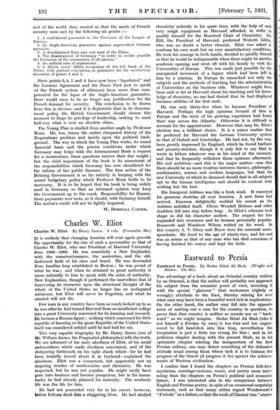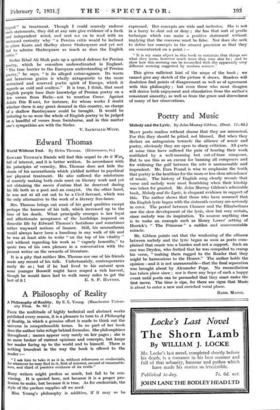Eastward to Persia
Tux advantage of a book about an Oriental country written by an Oriental, is that the author will probably not approach his subject from the romantic point of view, investing it with the special " glamour " that westerners (rightly or wrongly) attribute to the East, thereby ruining for ever what once may have been a beautiful word rich in implications. On the other hand, the author may fall into the opposite error of making out a case for the country in question, to prove that that country is neither so remote nor so " back- ward " as we might imagine. Sirdar Ikbal All Shah (who is not himself a Persian by race) is too wise and too experi- enced to fall head-first into this trap, nevertheless the temptation is just a little too strong for him ; and in his judicious chapter dealing with the present Shah, as in his optimistic chapter relating the inauguration of the first Persian railway, one may detect something of the defensive attitude usual among those whose task it is to balance the progress of the Orient (if progress it be) against the achieve- ments of Western civilisation.
I confess that I found the chapters on Persian folk-lore, mysticism, marriage-customs, music, and poetry more inter- esting than the chapters on Persia's political and economic future. I was interested also in the comparison between English and Persian poetry, in spite of an occasional surprising statement, such as that many critics regard Wordsworth's "Prelude" as a failure, or that the work of Chaucer was "stereo-
typed" in treatment. Though I could scarcely endorsi such statements, they did at any rate give evidence of a fresh and independent mind, and sent me on to read with an increased curiosity why " a Persian critic would be inclined to place Keats and Shelley above Shakespeare and yet not fail to admire Shakespeare as much as does the English critic."
Sirchir Ikbal Ali Shah puts up a spirited defence for Persian poetry, which he considers underestimated in England. " The true. barrier to the European understanding of Persian poetry," he says, " is its alleged extravagance. Its warm and luxurious genius is wholly antagonistic to the more restrained and reserved poetic spirit of Europe, which it regards as cold and soulless." It is true, I think, that most English people base their knowledge of Persian poetry on a few verses from Ha fiz—not to mention Omar. Against Jalalu Din R umi, for instance, for whose works I doubt whether there is any great demand in this country, no charge of a shallow flamboyance could be brought. It would be irritating to us were the whole of English poetry to be judged on a handful of verses from Swinburne, and in this matter one's sympathies are with the Sirdar.
V. SACKVILLE-WEST.











































 Previous page
Previous page